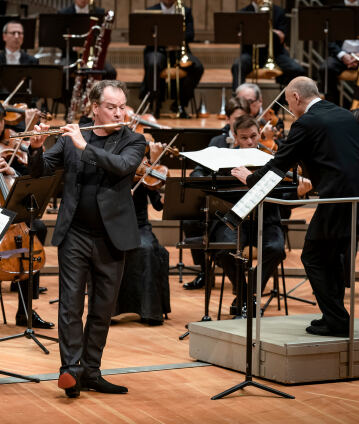Paavo Järvi and Emmanuel Pahud

His highly acclaimed recordings prove it: for Paavo Järvi, Beethoven is not simply an overpowering titan, Sibelius not merely a Nordic melancholiac – instead, he conveys the youthful power of this music. Järvi conducts Beethoven’s Eighth and Sibelius’s Seventh Symphony at this concert. In addition, Emmanuel Pahud gives the world premiere of a flute concerto by Erkki-Sven Tüür. The music of the Estonian composer and former rock musician is atmospheric and energetic.
Jean Sibelius “brooded for years over the Eighth Symphony as if it were the Ninth”, Theodor W. Adorno scoffed in his infamous comment on the Finnish composer. To regard Sibelius as a major successor to Beethoven obviously seemed absurd to the music theorist. Fortunately, people see things differently today, as this programme with Beethoven’s Eighth Symphony and Sibelius’s Seventh Symphony conducted by Paavo Järvi shows.
Both works frame the premiere of a new flute concerto by composer Erkki-Sven Tüür, who himself played flute in a rock band at the beginning of his career. Stylistic versatility is also to be expected in this new composition, whose soloist is the Philharmoniker’s principal flute Emmanuel Pahud.
Sibelius’s Seventh Symphony, whose first performance with the Berliner Philharmoniker was conducted by Wilhelm Furtwängler in 1935, was to be the composer’s last contribution to the genre. He actually burned the sketches for an Eighth Symphony after years of work. In his Seventh, Sibelius dispensed with the traditional division into several movements in favour of an uninterrupted flow, in which the themes are modified in ever new ways.
Beethoven’s Eighth Symphony can stand proud beside its generally more famous genre neighbours. It does not have an animated slow movement, nor does it have the creedal character of the choral symphony. But in its cheerfulness, in the effective interplay of contrasts and in the witty parody of a metronome, the consummate mastery of its author is revealed here as well.
© 2022 Berlin Phil Media GmbH
Related interviews
Artists
Our recommendations
- Boulez meets Stravinsky
- Philharmonic chamber music: “Rêverie française”
- Benefit concert “Together for humanity”
- 2001 Europakonzert from Istanbul with Mariss Jansons and Emmanuel Pahud
- Daniel Barenboim conducts Strauss and Carter
- A musical journey with the brass and percussion of the Berliner Philharmoniker